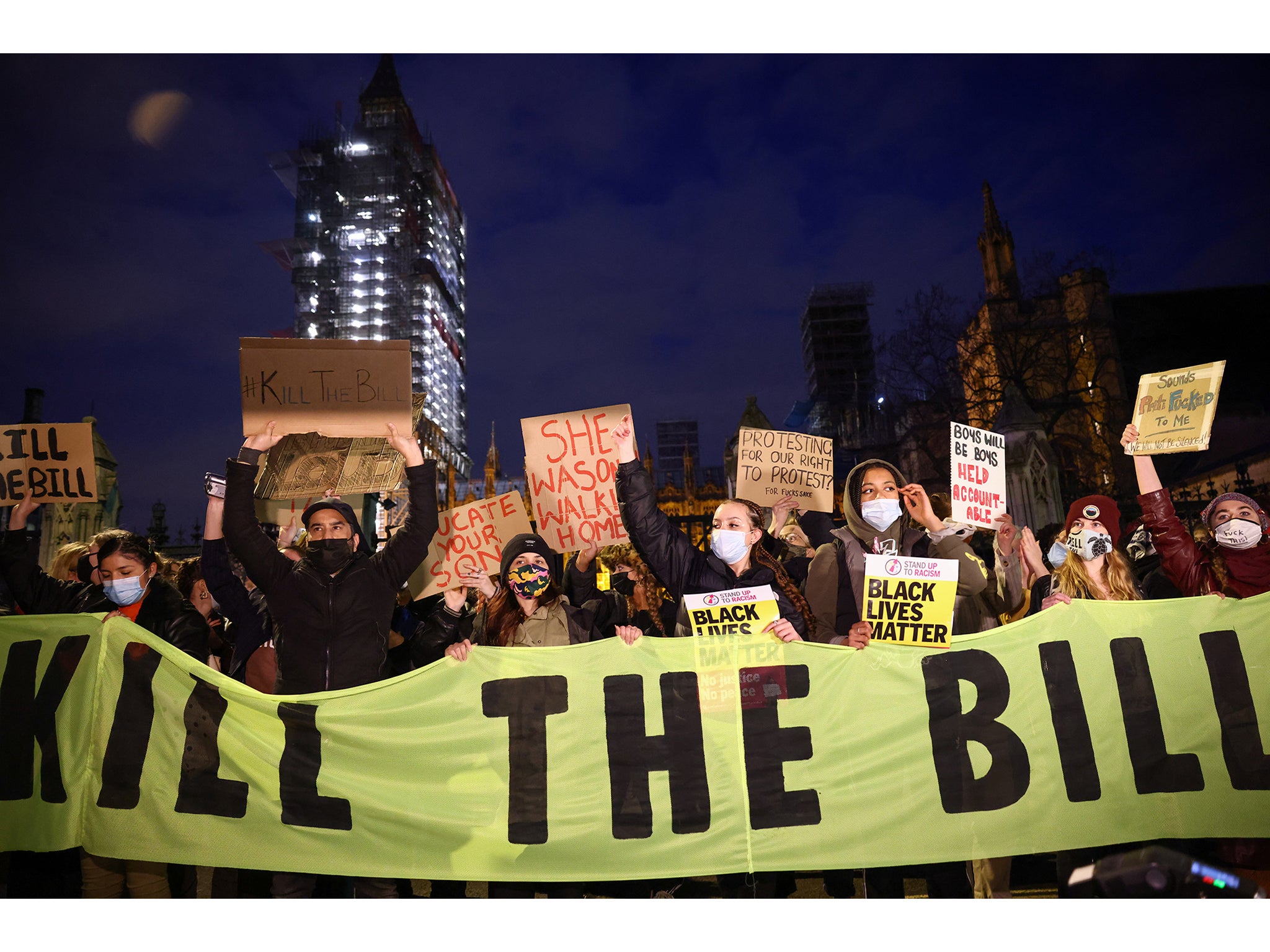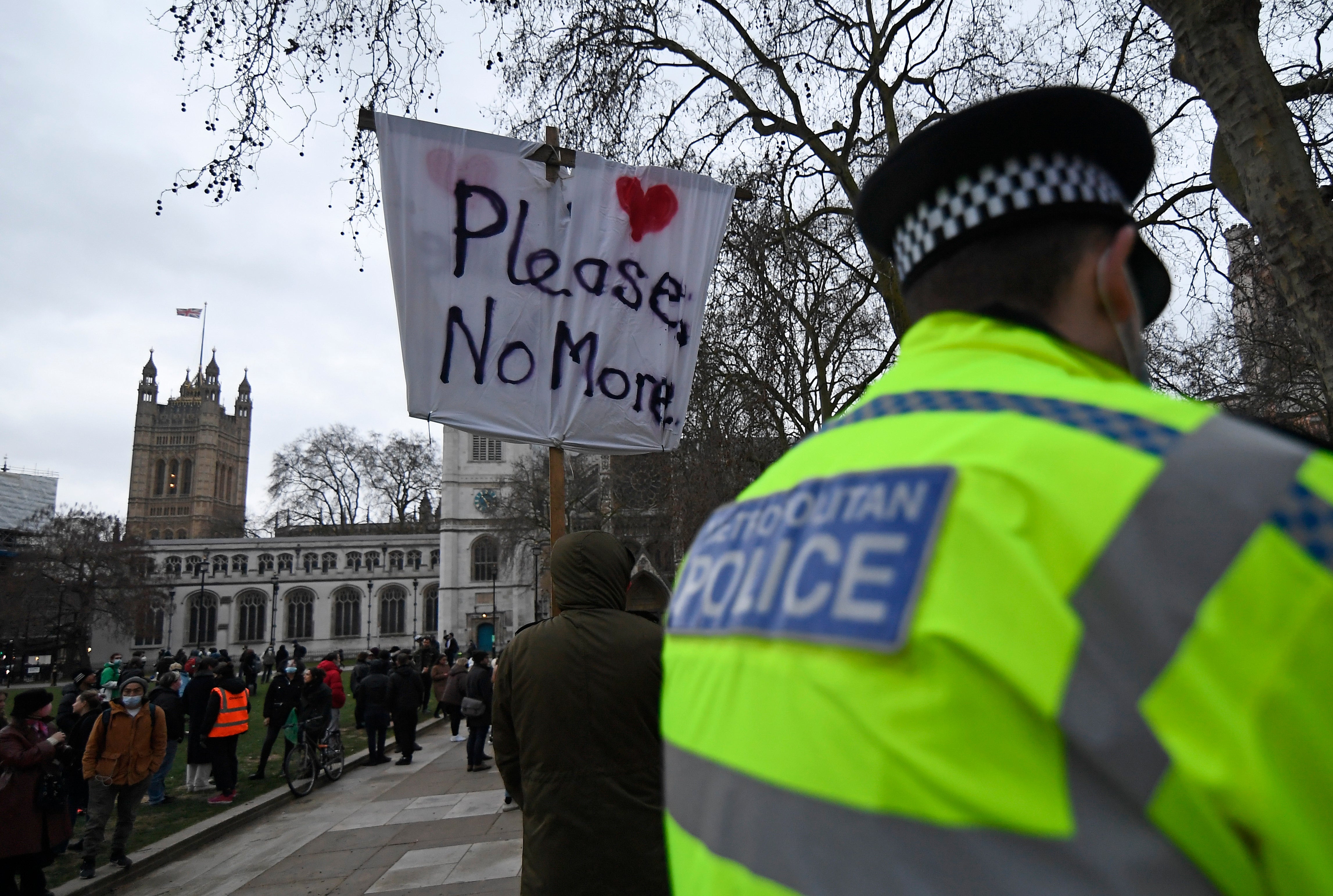New protest bill will deepen racial inequality, campaigners warn Boris Johnson
Government document concedes there is ‘limited evidence that the combined set of measures will deter offenders long term or reduce overall crime’

A coalition of criminal justice and race equality organisations has written to the prime minister warning that the government’s plans for policing and sentencing will further entrench racial inequality in the criminal justice system.
The Police, Crime, Sentencing and Courts Bill entered parliament last week, and will be debated by ministers on Monday and Tuesday. It contains a number of proposals which the government itself has conceded will have a disproportionate impact on Black, Asian and minority ethnic (Bame) people in equality assessments.
The government has justified this inequality as “a proportionate means of achieving the legitimate aim of protecting the public”. However, in another official document, the government admits there is “limited evidence that the combined set of measures will deter offenders long term or reduce overall crime” and therefore cannot be guaranteed to actually benefit society.
The organisations call for the ministers to withdraw the elements of the bill it acknowledges will increase racial inequality and launch a public consultation around the changes to avoid discrimination.
Nina Champion, director of the Criminal Justice Alliance, said: “These unnecessary and discriminatory changes to sentencing and police powers will deepen existing racial inequalities, sweeping more Black, Asian and minority ethnic people into the criminal justice system for increasing periods of their lives.
Read more:
“They will also miss out on the more positive proposals in the bill. Initiatives to divert people from the criminal justice system into community rehabilitation will depend on a guilty plea, and we know Black, Asian and minority people are less likely to plead guilty due to distrust in the system. Rather than reducing racial inequality, as the government has committed to do, this bill does the complete opposite.”
In a policy paper relating to the the bill, the Ministry of Justice admitted: “By virtue of the overrepresentation of these groups in the cohort of offender to which this policy applies, we acknowledge that any adverse impacts arising from these changes will be more likely to affect male and Black offenders.”
“While the available data shows that Black children are disproportionately represented in the youth custodial remand population, the evidence that Bame offenders may be perceived as a higher risk suggests they may be less likely to benefit from these changes,” it added.

The Lammy Review (2017), led by shadow justice minister David Lammy, found that Black people make up around 3 per cent of the general population but accounted for 12 per cent of adult prisoners in 2015-16; and more than 20 per cent of children in custody. Other groups, such as mixed race adult prisoners, are also overrepresented, although to a lesser degree.
Arrest rates are generally higher across minority ethnic groups in comparison to the white group. In particular, Black and mixed race groups are arrested at much higher rates.
Shadae Cazeau, Head of Policy at Equal, said: “We predict that the changes introduced by the Police, Crime, Sentencing and Courts Bill will lead to a further increase in racial disparities across the criminal justice system and deeper feelings of mistrust from Black, Asian and minority ethnic communities. The government must engage with the communities who will be disproportionality impacted by the proposals to really understand the implications of the bill. We call on the government to withdraw and consult on the bill as a matter of urgency.”
Pippa Goodfellow, director of the Alliance for Youth Justice, said: “This bill supposedly sets out a radical new approach to sentencing. But in reality, it represents a raft of missed opportunities for necessary and meaningful reform, failing to address burning injustices in the youth justice system. The government claims that addressing racial disparity is a priority, but the proposed measures come with an explicit acknowledgement that they will exacerbate existing inequalities.”
Jess Mullen, director of Influence and Communications at Clinks said: “This bill was not preceded by the conventional consultation undertaken prior to presenting a bill to parliament on a matter of this importance.
“The expertise that resides in the voluntary sector, as a result of 150 years experience working in criminal justice, and in particular the knowledge and views of organisations that are led by and specialise in working with Black, Asian and minority ethnic people, has not been drawn upon to inform these proposals and ensure that they are able to improve – rather than worsen – outcomes for Black, Asian and minority ethnic people.”
The policing and sentencing proposals, which will impact a disproportionate number of Bame people, include moving the release point from halfway to two-thirds for custodial sentences of four to seven years, increasing the minimum term for life sentences for children and introducing a requirement for judges to give minimum custodial sentences for certain repeat offences.
Ministers also aim to introduce discretionary powers that would allow the secretary of state for justice to prevent the automatic release of people deemed dangerous and Serious Violence Reduction Orders, which will allow police to stop and search people without suspicion if they have previously been convicted for carrying a knife.
There are also plans for positive schemes such as Out of Court Disposals and Problem-Solving Courts to rely on a guilty plea. As noted in the Lammy Review, ethnic minority people are less likely to plead guilty due to a lack of trust in the system.
A Ministry of Justice spokesperson said: “The government makes no apologies for legislating to ensure violent and sexual offenders spend more time in prison. We are determined to tackle the deep-rooted causes of racial disparity in the justice system and the number of black and minority ethnic children entering it has fallen by three-quarters over the last decade. Ultimately this bill will cut crime, build safer communities and restore faith in the justice system.”
Join our commenting forum
Join thought-provoking conversations, follow other Independent readers and see their replies
Comments
Bookmark popover
Removed from bookmarks